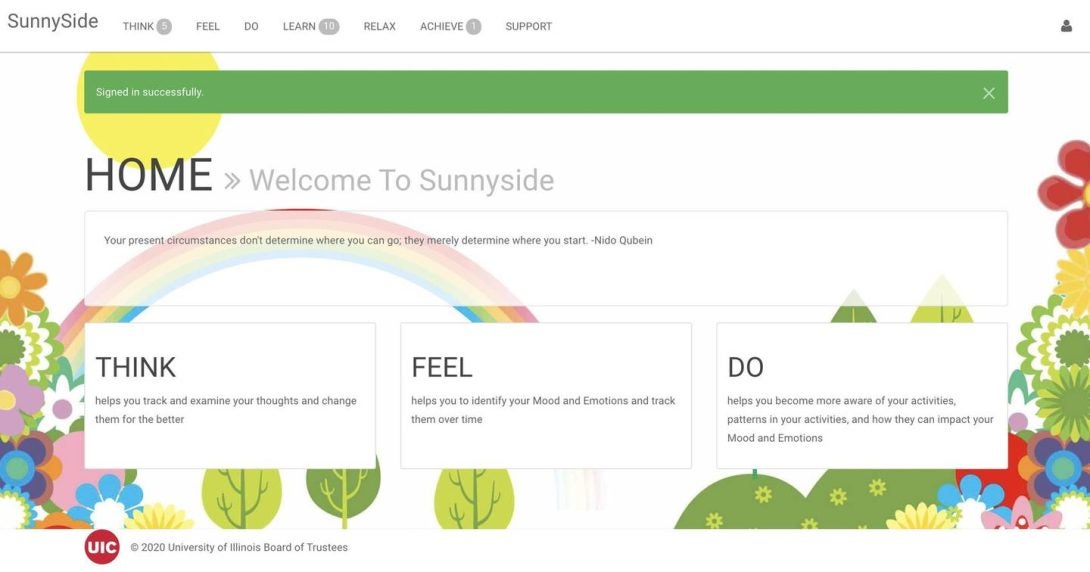Making Depression Treatment More Accessible for Chicago Moms
Intro Heading link

Depression is the most common pregnancy complication for women. Among women of color, rates of depression during pregnancy are even higher.
“It’s important to say that the women we see in our clinics are extremely resilient and they are able to cope with so much,” says Dr. Pauline Maki, professor of psychiatry, psychology and obstetrics & gynecology at the University of Illinois at Chicago.
“Hormonal changes during pregnancy can contribute to depression and a pharmacological solution like antidepressants can help. For many women though, the root of depression is financial stress, unresolved childhood trauma, or interpersonal violence. That’s where psychotherapy can help.”
Dr. Jenna Duffecy, also at UIC, developed a remote treatment for depression called Sunnyside for Moms, and with Dr. Maki and her team, this treatment was tailored for low-income Black and Hispanic women. Through culturally relevant online video modules shown to be effective in previous trials, women receive cognitive behavioral therapy and coping skills to treat depression.
The question on Dr. Maki’s mind was: What’s the most effective way to get this into the hands of moms to improve their health and the health of their families?
Incorporating an effective, accessible treatment for depression into standard care Heading link

Women face many barriers to depression treatment: from a lack of health coverage, to long waitlists for psychotherapy, to stigma about mental illness.
“A remote treatment like Sunnyside for Moms eliminates problems like paying for a babysitter and then taking public transportation to get face-to-face treatment,” explains Dr. Maki. “You don’t have to explain your absence to a family member who might be asking, ‘Where do you go every Thursday at 2:00?’ That is especially important if they’re experiencing interpersonal violence.”
With CTSA funding, Dr. Maki, Dr. Duffecy, and Dr. Stacie Geller, director of the Center for Research on Women and Gender, tested a method for incorporating Sunnyside for Moms into standard care: women completed an electronic screening for depression and other mental health conditions in the waiting room during routine prenatal clinic visits at the UI Wellness Clinic on Halsted. The trial showed that women found the screening questionnaire easy to complete and it was a low burden on clinic staff to administer.
And, just as important, that study and ongoing work at the UIC Center on Women’s Health showed just how high rates of depression are among pregnant women whom the clinic serves.
This led to a new realization: depression — and comorbidities like generalized anxiety disorder, PTSD, and substance misuse — is prevalent enough that all pregnant women should automatically be offered Sunnyside for Moms as part of their routine clinic care. This would also reach any women who weren’t willing to disclose symptoms of depression. By auto-enrolling women, Sunnyside for Moms could serve as a bridge to care for depression.
The importance of translational research Heading link

Dr. Maki notes that funding for implementation science from UIC’s Center for Clinical and Translational Sciences was essential.
“CCTS’ commitment to research focusing on bench to bedside and community made this research possible and a priority. We need to understand what does and doesn’t work in a clinic to get evidence-based care like Sunnyside for Moms to populations,” she explains.
Based on the data from their pilot study, her team has applied for a grant from the National Institutes of Health to incorporate Sunnyside for Moms into care at eight clinics on the South Side.
“My dream is that eventually Sunnyside for Moms can be customized for each woman’s situation, ethnicity, language, and support system,” says Dr. Maki. “Do you have a partner? Are you under financial stress? How many kids do you have at home? When you are depressed, do you get angry or do you withdraw? Based on a woman’s situation and stressors, we can customize the tools for her and strengthen her existing coping skills.”
Because of Dr. Maki and Dr. Duffecy’s work, women are one step closer to getting effective, easily accessible depression treatment — leading to healthier women, families, and communities on Chicago’s South Side.